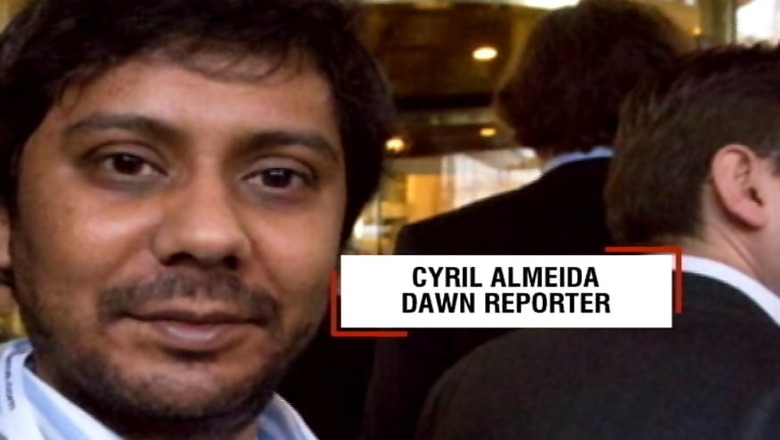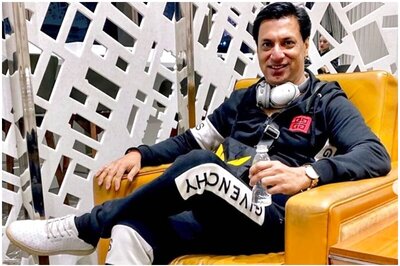
views
New Delhi: “I don’t see a very bright future for Pakistani journalism”
When he uttered these words a year ago during a visit to Goa, Cyril Almeida may have had no idea that the future he was talking about would come true in less than a year.
Almeida, an assistant editor with Pakistan’s most-reputed English daily Dawn, has been barred by Islamabad from leaving the country.
His fault: breaking a story on an “undisclosed” meeting last week between the country’s civil and military leadership where the government reportedly read out the riot act to the country’s army and its spy agency ISI.
“Puzzled, saddened. Had no intention of going anywhere; this is my home Pakistan,” Almeida tweeted early Tuesday morning as he got the information he has been put on the country’s ‘Exit Control List’.
Pakistani media fraternity and human rights activists are hopeful that he will not be penalised for carrying out his job, and his newspaper – founded by Pakistan’s founder Mohammed Ali Jinnah in 1948 – has thrown its weight behind Almeida.
Not many people on this side of the border know that Almeida belongs to the micro-minority of Goan Catholics living in Karachi. His ancestors migrated to the port city almost a hundred years ago and made it their home.
He first visited Goa only in 2012 to participate in Goa Arts and Literary Festival (GALF), and then followed it up with two more visits, the last one in December 2015. His friends say the Almeda family still speaks Konkani at home.
In an interview he had said “The accent, expressions and pronunciations of the Goan vernacular sound very familiar to my ear. Two generations ago, people would either speak Konkani or be familiar with it, but, now we largely speak Pakistani English”.
A fan of Goan cuisine, he took home the Goan Rechado Masala on each of his visits, remembers a friend, requesting anonymity because of the sensitive nature of the discourse enveloping Almeida, India and Pakistan.
The older Karachi Goans still visit home for St. Francis Xavier’s festival. But Almeida’s generation has moved on. Many of them have left for Europe and America looking for safety and better opportunities.
Almeida could not be reached for his comments, with his phone unreachable since his story was published last week.
According to historical documents, under the Portuguese rule Goan Catholics started migrating to Karachi more than 150 years ago.
After partition, a few of them held high posts in Pakistan Army, police, railways, courts and the hospitality industry. An old report in the Dawn hails the Goan community for bringing “a unique touch of exuberance and vivacity” to Karachi of the 1960s.
It was the same Goans of Karachi who gave India and Pakistan their first Cardinals – Cardinal Valerian Gracias and Cardinal Joseph Cordeiro. Also a number of bishops and archbishops, including in Delhi, Allahabad, Pune, Nagpur, Kolkata, Karachi, Lahore and Islamabad.
Among the most famous Goan Pakistanis is Charles Lobo who was a judge of the Sind High Court and the chairman of the Public Service Commission of Pakistan. He was also Pakistan’s delegate to the United Nations.
Hermond Raymond was chief prosecutor and a high court judge of Sind and Baluchistan. Pakistan’s first military dictator Ayub Khan made him the chairman of a Special Judicial Committee to investigate political corruption. His brother Maurice Raymond was the first general manager of Karachi Port Trust.
Joseph D’Mello was the chairman of Pakistan Railway Board. A celebrated Goan Catholic Sydney Pereira was the chairman of Pakistan Atomic Energy Commission.
It wasn’t only in officialdom that Pakistan’s tiny Goan community made its mark.
It produced a fair amount of sportsmen. Mennen Soares was the only Goan to represent the country in badminton. Phoebe Dias Barboza was the number one Women badminton player of Pakistan.
Bertie Gomes excelled in heavyweight boxing, while in cricket, Mathais Wallis and Antao D'Souza played test cricket for Pakistan. He was described as the “safest pair of hands” by none other than the great Sir Garfield Sobers and considered to be the best slip fielder Pakistan ever produced. He also served as a national cricket selector and was the captain of the National Bank of Pakistan team.
The police and ministry had its share of Goans in its highest echelons. Among the distinguished officers included Blasé Mascarenhas, who was decorated with a 'Tamgha-e-Khidmat' by President Ayub Khan.
Blasé retired as the deputy director of the Intelligence Bureau and settled abroad. Another prominent name is Patrick J Rodrigues, who was a senior Intelligence Officer of high repute in early 1960s.
Goan men who served the Pakistan armed forces included Brigadier Mervyn Cardoza, who was also decorated with the Tamgha-e-Khidmat in one of the Indo-Pak wars. Other reputed Pakistani army officers from the community include his brother, Colonel Eric Cardoza, Lt. Col. David DeSouza, Major Joseph Lobo, Major Kenneth Cardoza, and Brigadier Dr Hilary Zuzarte of the Medical Corps (seconded to the Pakistan Air Force as an Air Commodore) and Brigadier FG Pinto, Director Pakistan Signals.
At the centre of Goan Catholic community in Karachi was the 125-year-old Karachi Goan Association or KGA, one of the oldest clubs in the Indian sub-continent. In 1886, Goans started the Goan Portugese Association, which was later renamed as Karachi Goan Association.
At its peak, it held 10 days of celebrations where top Goan bands performed. During World War II, the Karachi Goan Association was turned into Senior Officers Club for the US Army.
Even though there is no official data, the Goan Association says they still have 12,000-15,000 Goan Konkani Catholics living in Pakistan, most of them settled in older parts of Karachi. The KGA is one of the only two clubs allowed to serve and sell alcohol in all of Karachi.
A lot of Goans may have left, but they have taken a small piece of Karachi with them, says KGA website. Brian Gonsalves, a Goan from Karachi, who now lives on the Island of Margarita in Venezuela, wrote to Goans of Pakistan: “My House in Venezuela is called ‘Pakistan’ – how is that for patriotism!!”




















Comments
0 comment